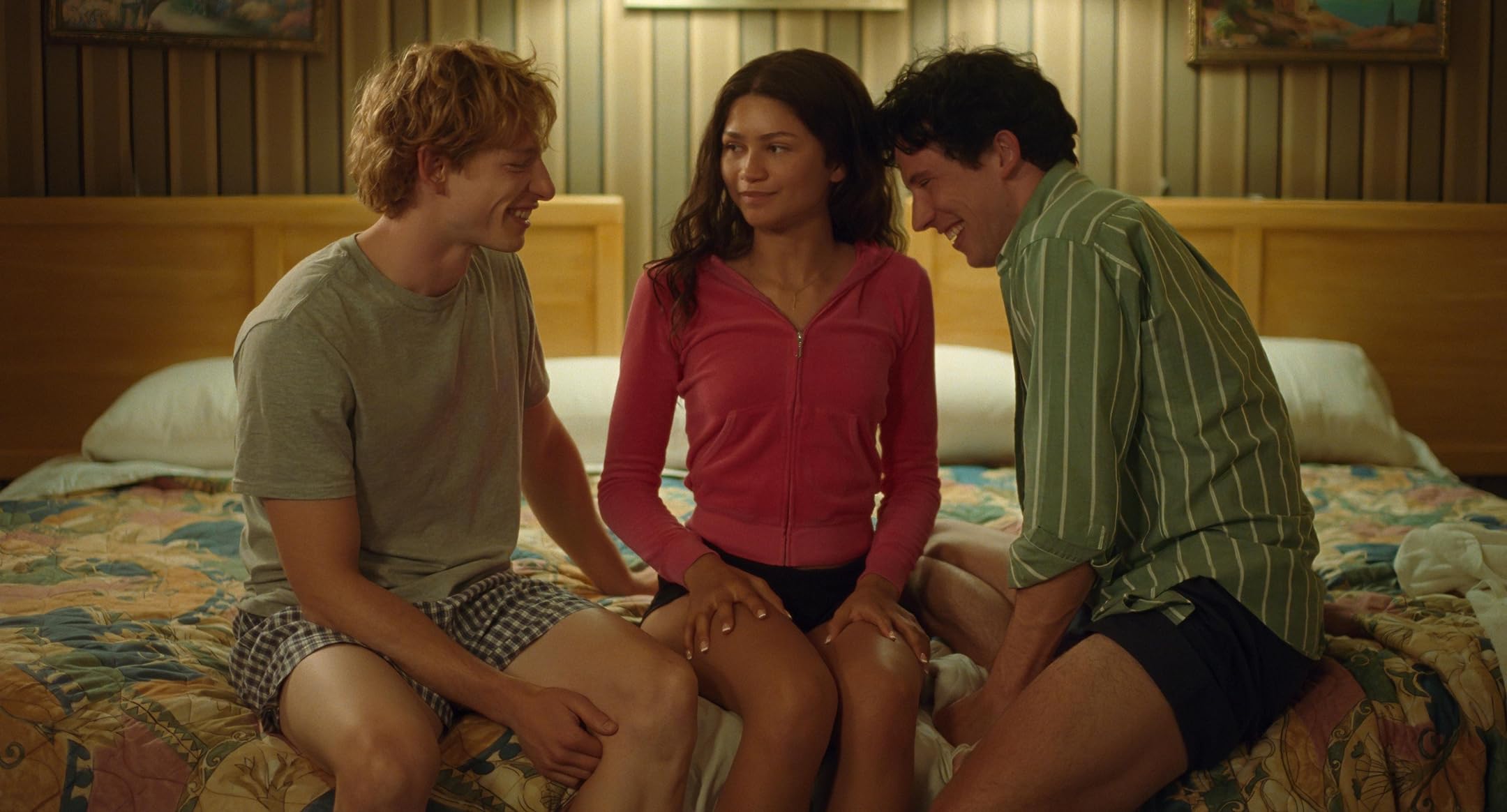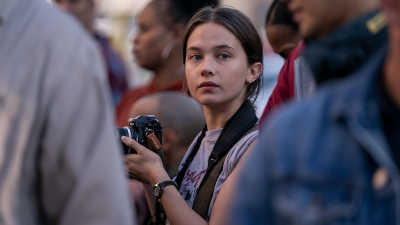Long Live the Challengers




Film
We all knew what we were getting into when Challengers was getting ready to come out. A Luca Guadagnino love triangle film centered on tennis? Surely we were privy to the stylings of Guadagnino's previous films and how that would leak over into Challengers. Sexual subtext, tension, and casual eroticism with some character complexity sprinkled in are all different flavors that resemble an archetypical film of his. Time and time again these themes have burst off the screen with films like his colloquial trilogy centered on desire (A Bigger Splash, I Am Love, Call Me By Your Name) or even his latest film, a plunge into romance-horror, Bones and All. Portraying desire, and other sensual emotions through careful proximity between characters is not only the Guadagnino way, but also omnipresent in Challengers. A love triangle between the tennis prodigy that couldn't be, Tashi (Zendaya), the star that was, Art (Mike Faist), and the champion that was never, Patrick (Josh O'Connor) is all the romantic setup Luca needs to push forth the overtly sexual undertones-and overtones, feverishly. Their individual and combined relationships are explored throughout a 13-year period, culminating in a final tennis match between Art and Patrick. Where the past, present, and future all come together on opposite sides of the net. As friends, foes, or something a little more fiery.
But while I was well-prepared for another sexually charged movie, I wasn't totally ready for Luca to be this deep in his director bag.
Challengers is by far the most visually stunning film in Guadagnino's filmography. The marriage between his direction, and some rather daring camera work from frequent collaborator Sayombhu Mukdeeprom, create some of his most electric scenes. Split triopter sequences, a tennis ball camera, see-through tennis courts, I mean what the hell? Challengers takes the idea of tennis being a spectator sport, chews it up, and spits it back in your face. Because your face is literally in the middle of the match that punctuates the film's finale. As immersive as it is entertaining, it's difficult to say anything negative about the new modern styling that Guadagnino brought to the table. Where his prior films were more muted, reserved and maybe I'll say careful, he decides to experiment with more exaggerated direction here. And I'm happy to say it worked. It worked incredibly well.
Now of course we have some textbook Guadagnino flair peppered throughout. Up close, and personal shots, encroaching on the lips of Art, Patrick, and Tashi during moments of dialogue establish classic sexual tension. Sure there's a lot of substantial romantic action, ceding some of the suspense, but there's much more of the possibility of a kiss, or sexual escalation, that builds within Challengers. The shot selection (pun intended) also operates outside of this rather predictable set of parameters. To put a microscope on the relationships each character has with one another, in a purely plutonic way (homoeroticism aside). Art is best friends with Patrick while they both fight for the same romantic interest, who happens to date/marry them at different times. In such a lush, visually appealing film focused on a spectator sport, it's the intimate moments between the contest that allow us to truly get a personal look at the players. Challengers can be coy in these troughs, dragging through romanticism with overt imagery that can feel misleading or obfuscating, but the end product justifies the means.
That's because Justin Kuritzkes' screenplay sharply pits the trio against one another while crescendoing their interpersonal tension throughout. Sexual tension between the three is palpable, almost blocking out the sun at times. Art and Patrick's history, aided by the aforementioned camera work and sub-context (shout out to the churros), creates an extra layer of distress for the relationships between Art/Tashi and even Patrick/Tashi. But what's more remarkable is how Challengers portrays Tashi. As a tennis ball personified, ricocheting back and forth between competitors, yet she may just be in control of the whole thing. Is she a mere tool, an object of desire for these two men, who believe they're making all the right moves-strokes, if you will-to win the match? Or is Tashi operating at a higher level of autonomy, calling the shots? What's in bounds, a fault, and who is the winner of the so-called match? Are we still talking about tennis?
All of this is miraculously written into Tashi's complex character, played amazingly well by Zendaya in one of her darkest roles since Euphoria. And Kuritzke's writing carefully explores Art and Patrick's story, along with Tashi's involvement, through a series of back-and-forth flashbacks interspersed in the final tennis match. Jumping back and forth, back and forth, again and again, can create a confusing timeline but Kuritzke and Guadagnino do a commendable job leading the audience to a basic level of comprehension. It isn't that hard to follow. However, what these time jumps do haphazardly create, is a lagging pace. The kinetic profile of Challengers works to undo the elongated feel of the film, but the real savior is a bonafide awards player in Trent Reznor and Atticus Ross' score. Fast-paced drums and synth beats construct a gorgeous atmosphere of frenetic fury with each move on and off the court. Each beat quickens the pace of your heart, stimulating the on-screen tension. Reminiscent of an 80's video game semi-techno score, Reznor and Ross' work comes to a gorgeous conclusion over the final match. All of the tension comes to a breaking point, the pot has boiled over, and all that's left is for us to sit back and watch some great fucking tennis.
Froth
Luca Guadagnino's no stranger to gorgeous settings in his films. The rural Italian countryside in Call Me By Your Name, the foreboding West Germany dance academy in his Suspiria remake, or even the expeditious American countryside in Bones and All, Luca has certainly seen and shown us all. But Challengers introduces a new concept to the Luca atmosphere. A setting absolutely seething with Americana. Most apparent, being the visually pervasive nature of capitalism. Everything, and I mean everything, is branded as if Challengers is just one gigantic advertisement for the tennis world. But of course it makes sense because that's how tennis is. Celebrities, endorsements, advertising campaigns, the whole nine yards! So why not join in on the fun? Seapine Brewing's American Light Lager is the perfect pour of Americana to soothe the soul and fire you up simultaneously.
It's crushable, light, refreshing, and has a dry finish that keeps you coming back for more. Enjoy it on a hot day, on a cold day, on a boat, on land, hell even enjoy it on the tennis court! With a 4.0% ABV you're not doing yourself any favors by skipping that second pour so go ahead and indulge a little bit. Let the mild hoppiness wash over you like Mike Faist's excessively sweaty slow motion sequence, but with no saltiness. Challengers is an exquisite bit of entertainment so you may as well go with a beer that's easy to drink, allowing you to focus on the escalating tension and possibly even grooving to the Ross/Reznor score as you see fit.















